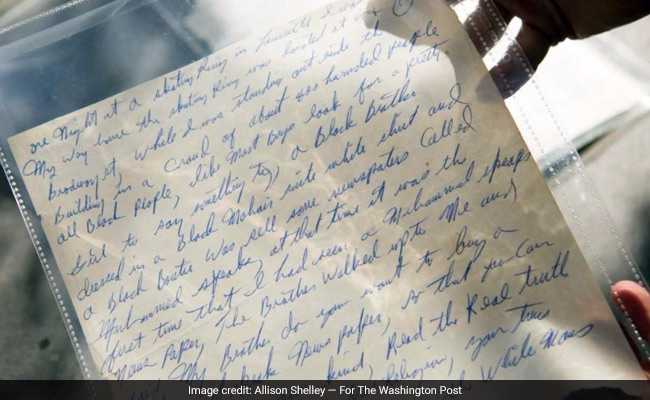The Real Reason Muhammad Ali Converted To Islam

Muhammad Ali's conversion to Islam, in many ways, defined his career and legacy as a fighter with conviction. He went on to become an icon for American Muslims.
Just years following his conversion in 1964, he got in a fight that prompted him to write down some reflections on what drew him to the faith in the first place.
It wasn't a fight in the boxing ring, but an argument at home with his wife, Belinda.
Ali was out of control, Belinda said. He had lost all traces of humility. He was acting like he was God. You may call yourself the greatest, she told him, but you'll never be greater than Allah.
Like a schoolteacher, Belinda instructed Ali to sit down and write an essay. She asked him to write about why he became a Muslim. Ali obliged, taking out blank sheets of paper and a blue pen and beginning to write.
Belinda now goes by the name Khalilah Camacho-Ali. When I interviewed her for my biography of the legendary boxer, she gave me the essay. On Wednesday, I took it to the National Museum of African American History and Culture to see whether curators would include it in their collection.
I think it belongs there - not only because it reveals a great deal about Ali's character, but also because it teaches us about the religious life of one of the country's best-known African American athletes and activists. His story reminds us that even the most powerful spiritual journeys can have humble beginnings.
In the letter, Ali writes of his teenage days in Louisville when he was still known as Cassius Clay Jr. He says he was leaving a roller skating rink and scanning the sidewalk for pretty girls when he noticed a man in a black mohair suit selling newspapers for the Nation of Islam.
Ali had heard of the Nation and its leader, Elijah Muhammad, but he had never given serious thought to joining the group, which used some elements of Islam to preach black separatism and self-improvement.
Ali took a newspaper, mostly to be polite, but a cartoon caught his eye. It showed a white slave owner beating his black slave and insisting the man pray to Jesus. The message was that Christianity was a religion forced on slaves by the white establishment. "I liked that cartoon," Ali wrote. "It did something to me. And it made sense."
It's interesting that Ali didn't answer his wife by writing in spiritual terms about why Islam attracted him. He wrote about it with pragmatism. The cartoon awakened him, and he realized that he hadn't chosen Christianity. He hadn't chosen the name Cassius Clay. So why did he have to keep those vestiges of slavery? And if he didn't have to keep his religion or his name, what else could he change?
In 1964, when he won the heavyweight championship, he publicly declared his conversion and made a personal declaration of independence: "I believe in Allah and in peace," he said. "I don't try to move into white neighborhoods. I don't want to marry a white woman. I was baptized when I was 12, but I didn't know what I was doing. I'm not a Christian anymore. I know where I'm going and I know the truth and I don't have to be what you want me to be. I'm free to be what I want."
In the years that followed, Ali continued to explore his religious views. He didn't always have a clear philosophy. He didn't always live up to the principles he espoused. But he never stopped asking questions.
When Elijah Muhammad died and the Nation of Islam remade itself, Ali embraced orthodox Islam. He studied the Koran.
As Parkinson's disease slowed his speech and made it more difficult for him to entertain fans, he would sometimes invite admirers to join him for long religious discussions. He loved comparing the Bible and the Koran. He often said that God didn't care about him for his boxing; God cared only about whether he had been a good person and lived up to the responsibilities that came with being a believer.
I'm not prepared to give Camacho-Ali all the credit, but it strikes me that the writing assignment she gave him was a good one. Religion demands that we constantly ask questions, not just accept things because they've been handed down to us. Ali's essay reminds us of that.
Ali acknowledged that his religious journey began with a search for pretty girls and took a turn with a newspaper cartoon. It's hardly the stuff of legend. But it's better than legend, really, because it's true.
(This story has not been edited by NDTV staff and is auto-generated from a syndicated feed.)
Thanks for the feedback. I will check it.
LEGEND ... Awsum post.
Congratulations @jhudeff1418! You have completed some achievement on Steemit and have been rewarded with new badge(s) :
Click on any badge to view your own Board of Honor on SteemitBoard.
For more information about SteemitBoard, click here
If you no longer want to receive notifications, reply to this comment with the word
STOPAgain thank you @steemitboard for these awesome award
Congratulations @jhudeff1418! You have completed some achievement on Steemit and have been rewarded with new badge(s) :
Click on any badge to view your own Board of Honor on SteemitBoard.
For more information about SteemitBoard, click here
If you no longer want to receive notifications, reply to this comment with the word
STOPThank you for this awesome awards @steemitboard
he is a legend!!
Good post..!!!
Good story...
Is a fact.